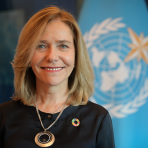Keynote address to International Gender Champions Climate Impact Group launch
Dear colleagues
The invitation to become an International Gender Champion fills me with immense pride and joy, knowing that it signifies a crucial step forward in addressing the gender dimensions of climate change.
The climate crisis is far from “gender neutral”. Women and men are affected differently by weather and climate, and therefore need gender-sensitive information and services.
In my short time as Secretary-General of the World Meteorological Organization I have had the privilege to meet with other international gender champions. I am delighted that the number of UN agencies is more gender balanced, in Geneva and elsewhere.
As you all know, I am the first woman to head the WMO, so I am acutely aware of the strides we have made in promoting gender equality, yet acknowledge the considerable work that lies ahead. My foremost priority is to foster greater diversity within the WMO, ensuring equitable representation across gender, regional, and cultural lines.
Being Argentinean affords me a unique perspective on the challenges faced by female scientists in developing countries, where opportunities remain constrained. I firmly believe that with unwavering dedication and passion, success knows no bounds, and I am committed to serving as a beacon of inspiration for women, especially the younger generations.
What have we been doing at WMO?
WMO’s Gender Action Plan dates back to 2015 to improve gender equality in all parts of the organization. It was also born out of the recognition that weather and climate change affect men and women in different ways.
The World Meteorological Congress in 2023 updated that policy. We are committed to the goal of “achieving gender equality and building resilience through the provision of gender-sensitive weather, hydrological and climate services which respond to the specific needs and socioeconomic circumstances of women and men.”
The target decided was to reach a minimum 40% of female members participation in governance bodies and their working structures. A target to reach not a quota to fill.
We just marked International Day of Women and Girls in Science on 11 February. We need to strengthen education and technical training for women scientists and technologists.
Women make great champions of climate action!
There is huge untapped potential to harness the role of women as climate leaders and advocates for climate resilience and sustainable development.
Women and girls are also disproportionately affected by climate change and weather-related disasters. In addition, we know that they have less access to climate information, early warnings, agricultural advisory services, mobile phone technology and financial credit. For example, a 1991 cyclone in the region of Central Asia resulted in more than 138,000 deaths, 90% of whom were women and children, the death rate of women aged 20-44 was 71 %, compared to 15 % for men, which means, at that time, that women had five times higher mortality rate than men. This is clear evidence of how climate change is related to inequality and vulnerabilities.
For example, more women than men died in the Indian Ocean Tsunami in 2004 because they were less likely to know how to swim and long clothing hampered their movement. Similarly, female casualties outnumbered male by 14:1 in the aftermath of Cyclone Gorky in Bangladesh, partially due to insufficient access to information and early warnings. A case study in Senegal showed that while all farmers needed information on seasonal onset of rains, length of rainy season etc., female farmers also required information on rainfall deficit forecasts and early seasonal rainfall cessation, as it could be devastating for them given that they plant their plots a month later than their male counterparts.
But men can also be vulnerable under certain conditions and require gender-tailored weather and climate services (for example, men tend to be heavily involved in emergency relief efforts and post-disaster rebuilding). And, of course, women can also play a central role in the survival and resilience of their families and communities. Women are very effective at mobilizing communities in the event of disasters. They are at the frontline in moving forward with recovery. Women further hold key knowledge in natural resources management, and are key actors in climate adaptation and mitigation.
As a result, many of WMO’s programmes to strengthen climate adaptation seek to address the barriers faced by women and marginalized communities in accessing resources and decision-making tools.
Fiji, one of the 14 Pacific SIDS that are WMO members, situated in the “tropical cyclone belt”, is frequently impacted by multiple devastating cyclones, floods and other disasters, increasing in intensity and frequency. The Government of Fiji has made significant efforts and is committed to integrating gender in disaster and climate change policies. Positive progress on different gender-related indicators were done, including measures undertaken to address gender-based issues in recovery, undertaking gender-disaggregated vulnerability and capacity assessments or including gender considerations in post-disaster needs assessments. Fiji Met service is also working to mainstream gender through the provision of early warning systems thanks to the support of our partners, like Climate Risk Early Warning Systems (CREWS).
To conclude, I am determined to use my voice as an international gender champion to ensure that gender considerations are mainstreamed in climate policies. We have no time to lose.
We stand at the intersection of inequality and climate change, and our strategies must reflect the urgency of the times.
I just became a grandmother for the first time. I care passionately about the future planet my grandson – and all other children – will inherit. I sincerely hope that the Climate-Gender Impact group WILL have an impact. We owe it to future generations.
I thank you.
Statement by


